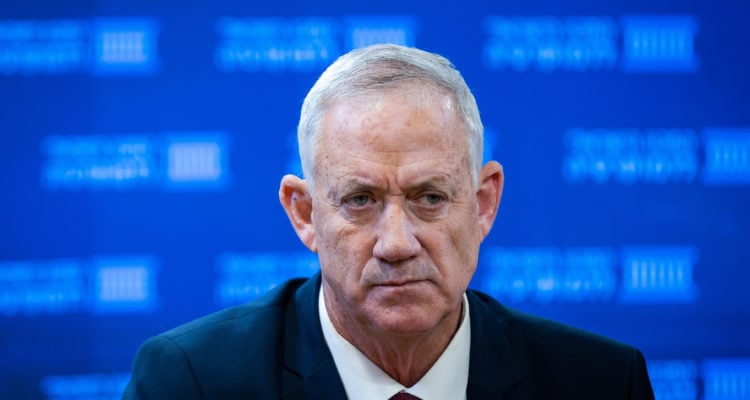|
Getting your Trinity Audio player ready...
|
Political Turmoil in Israel: Benny Gantz Calls for Early Elections Amidst War Crisis
Edited by: Fern Sidman
In the midst of a protracted conflict in Gaza with no immediate end in sight, Israel finds itself gripped by political turmoil as prominent opposition leader Benny Gantz advocates for early elections, aligning himself with the demands put forth by United States Senate Majority Leader Chuck Schumer, as was recently reported in The Sun of New York. The call for elections in September comes amidst mounting pressure on the government of Prime Minister Netanyahu, whose handling of the ongoing crisis has come under intense scrutiny both domestically and internationally.
Speaking at a press conference on Wednesday, Benny Gantz, a member of Israel’s war cabinet, emphasized the urgency of setting a date for elections, framing it as a necessary step towards restoring public trust and unity in the face of adversity, according to the report in The New York Sun. “We must agree on a date for elections in September, towards a year to the war if you will,” Gantz asserted, highlighting the symbolic significance of holding elections amidst the backdrop of the prolonged conflict. Gantz’s proposal aims to signal to the citizens of Israel that their voices will soon be heard, even as the nation remains embroiled in military efforts to eliminate the Hamas terrorist infrastructure in Gaza.
Prime Minister Netanyahu, on the other hand, faces mounting criticism over his handling of the crisis, particularly concerning the plight of the 134 Israeli hostages still held in Gaza six months into the war. As was observed by the New York Sun, Gantz seized upon this discontent, condemning Netanyahu’s leadership and asserting that what Israel needs is stability at the ballot box, not chaos in the streets.
For Benny Gantz and his National Unity party, early elections present an opportunity to regain lost ground in the political landscape. With Gideon Sa’ar’s departure from the United Right party in March, Gantz’s party has faced setbacks, dwindling to just eight seats from the 12 it secured in the previous election, as was indicated in the report in The New York Sun. However, recent polling suggests that Gantz’s popularity remains robust, with his party consistently polling above 30 seats, while Netanyahu’s Likud party struggles to maintain its stronghold, failing to surpass 20 seats.
The prospect of early elections amidst a backdrop of war raises critical questions about the priorities and responsibilities of Israel’s leadership. While some view it as a necessary step towards democratic renewal and accountability, others caution against further political upheaval during a time of national crisis. The divide between those advocating for change and those seeking stability underscores the deep-seated tensions and divisions within Israeli society.
As tensions escalate in the heart of the Middle East, a transatlantic political rift has also emerged, pitting United States Senate Majority Leader Chuck Schumer against Israeli Prime Minister Benjamin Netanyahu over the contentious issue of early elections amidst ongoing conflict. The New York Sun reported that Schumer’s vocal support for Israeli opposition leader Benny Gantz’s call for elections has drawn sharp rebuke from Netanyahu, underscoring the complex interplay of domestic and international dynamics shaping the region’s future.
Schumer’s endorsement of Gantz’s proposal for early elections reverberated across the political landscape, buoyed by a staggering 70% approval rate among the Israeli populace, according to a major poll. Embracing Gantz’s vision for democratic renewal, Schumer hailed the move as a necessary step towards ushering in much-needed change in Israeli leadership, according to the information in The New York Sun. “When a leading member of Israel’s war cabinet calls for early elections and over 70% of the Israeli population agrees, you know it’s the right thing to do,” Schumer asserted, signaling unwavering support for Gantz’s initiative.
The clash between Schumer and Netanyahu traces back to March, when the former made waves on the Senate floor by openly criticizing Netanyahu’s stance on peace in the Middle East and advocating for elections to replace him once the war in Gaza subsides. The Sun reported that Netanyahu swiftly condemned Schumer’s intervention, labeling it as “wholly inappropriate” and accusing him of meddling in Israel’s internal affairs. The public spat underscored the widening chasm between the two allies, as Netanyahu sought to rally support among Senate Republicans for his military strategy in the region.
Meanwhile Gantz has remained steadfast in his push for elections, despite his previous collaboration with Netanyahu in an emergency government formed in the aftermath of the Hamas massacre in October. The NY Sun report said that Gantz reiterated his commitment to securing the release of Israeli hostages held by Hamas, warning that failure to act decisively would prompt his withdrawal from the government. However, he stopped short of specifying his course of action should Netanyahu reject his demands, opting instead to focus on garnering support for his proposal.
Netanyahu, Israel’s longest-serving prime minister, has staunchly resisted calls for early elections, citing concerns over the potential ramifications on ongoing military operations. Likud, his political party, issued a stern rebuke against Gantz’s proposal, warning that elections at this juncture would only serve to embolden Hamas and jeopardize efforts to secure a hostage deal, as per the details in The NY Sun report. Netanyahu’s steadfast opposition underscores his determination to maintain stability and continuity in the face of mounting challenges.
As the political standoff intensifies, Israel finds itself at a crossroads, grappling with the competing imperatives of democratic governance and national security. The eyes of the world remain firmly fixed on Israel, where the fate of millions hangs in the balance amidst the specter of war and political upheaval.



